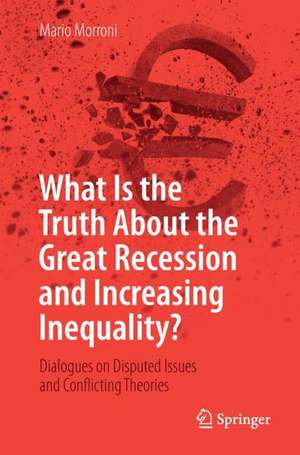What Is the Truth About the Great Recession and Increasing Inequality?: Dialogues on Disputed Issues and Conflicting Theories
Autor Mario Morronien Limba Engleză Paperback – 26 sep 2018
Have you ever puzzled over the causes of the 2007–8 financial crisis and wondered how it will affect all our futures? If so, this book is for you. Using imagined dialogue between three economists with contrasting theoretical perspectives and a student who knows little about economics, different interpretations are compared in straightforward, jargon-free language. The book explores both the consequences of neoliberal economic policies based on the belief in efficient, self-regulating markets and the implications of alternative economic visions formulated in response to the Great Recession. In all, nine dialogues are presented, each of which focuses on a key theme: increasing inequality, the failure of economists to predict the crash, the reasons for fiscal austerity, the rolling back of the welfare state, the roles of the state and the market, the repercussions of the German trade surplus and the Eurozone crisis, policies to confront the crisis, environmental degradation, and theneed for an industrial policy appropriate to the present day. The book will be ideal for both general readers and those embarking on the study of economics.
Preț: 53.93 lei
Nou
Puncte Express: 81
Preț estimativ în valută:
10.32€ • 11.22$ • 8.68£
10.32€ • 11.22$ • 8.68£
Carte disponibilă
Livrare economică 31 martie-14 aprilie
Livrare express 14-20 martie pentru 22.66 lei
Preluare comenzi: 021 569.72.76
Specificații
ISBN-13: 9783319986203
ISBN-10: 3319986201
Pagini: 216
Ilustrații: X, 204 p.
Dimensiuni: 155 x 235 x 19 mm
Greutate: 0.31 kg
Ediția:1st ed. 2018
Editura: Springer International Publishing
Colecția Springer
Locul publicării:Cham, Switzerland
ISBN-10: 3319986201
Pagini: 216
Ilustrații: X, 204 p.
Dimensiuni: 155 x 235 x 19 mm
Greutate: 0.31 kg
Ediția:1st ed. 2018
Editura: Springer International Publishing
Colecția Springer
Locul publicării:Cham, Switzerland
Cuprins
Prologue.- Increasing inequality.- The failure to predict the Great Recession.- Why fiscal austerity?.- Rolling back the welfare state.- The state and the market.- The gigantic German trade surplus and the euro.- Crisis policy.- Environmental degradation.- Industrial policies.
Notă biografică
Mario Morroni is Professor of Economics at the University of Pisa and a Life Member of Clare Hall, College for Advanced Study, University of Cambridge (United Kingdom). He has previously authored a book on technical change and production processes (Cambridge University Press, 1992) that received the Myrdal Prize and also a book on the theory of the firm (Cambridge University Press, 2006). He is the author of a number of further works in the areas of microeconomics, macroeconomics, labor economics, and industrial economics.
Textul de pe ultima copertă
Have you ever puzzled over the causes of the 2007–8 financial crisis and wondered how it will affect all our futures? If so, this book is for you. Using imagined dialogue between three economists with contrasting theoretical perspectives and a student who knows little about economics, different interpretations are compared in straightforward, jargon-free language. The book explores both the consequences of neoliberal economic policies based on the belief in efficient, self-regulating markets and the implications of alternative economic visions formulated in response to the Great Recession. In all, nine dialogues are presented, each of which focuses on a key theme: increasing inequality, the failure of economists to predict the crash, the reasons for fiscal austerity, the rolling back of the welfare state, the roles of the state and the market, the repercussions of the German trade surplus and the Eurozone crisis, policies to confront the crisis, environmental degradation, and the needfor an industrial policy appropriate to the present day. The book will be ideal for both general readers and those embarking on the study of economics.
Caracteristici
Explains and compares different economic visions Presents nine dialogues on increasing inequality, the Great Recession, and the Eurozone crisis Critically discusses neoliberal ideologies Comprehensible to the reader who is not an economist but wants to get to the truth regarding recent economic events
